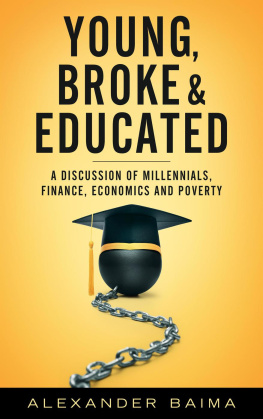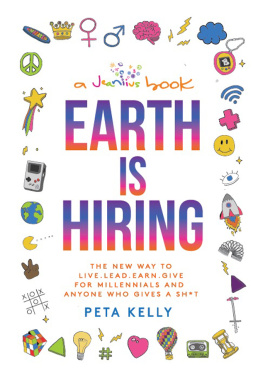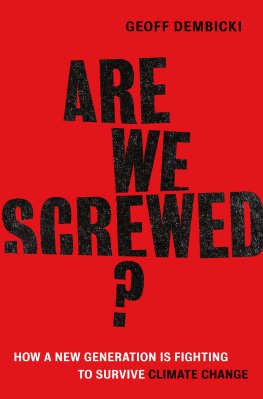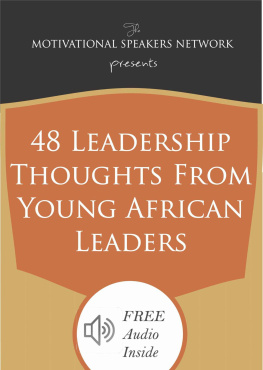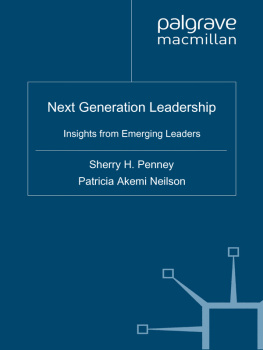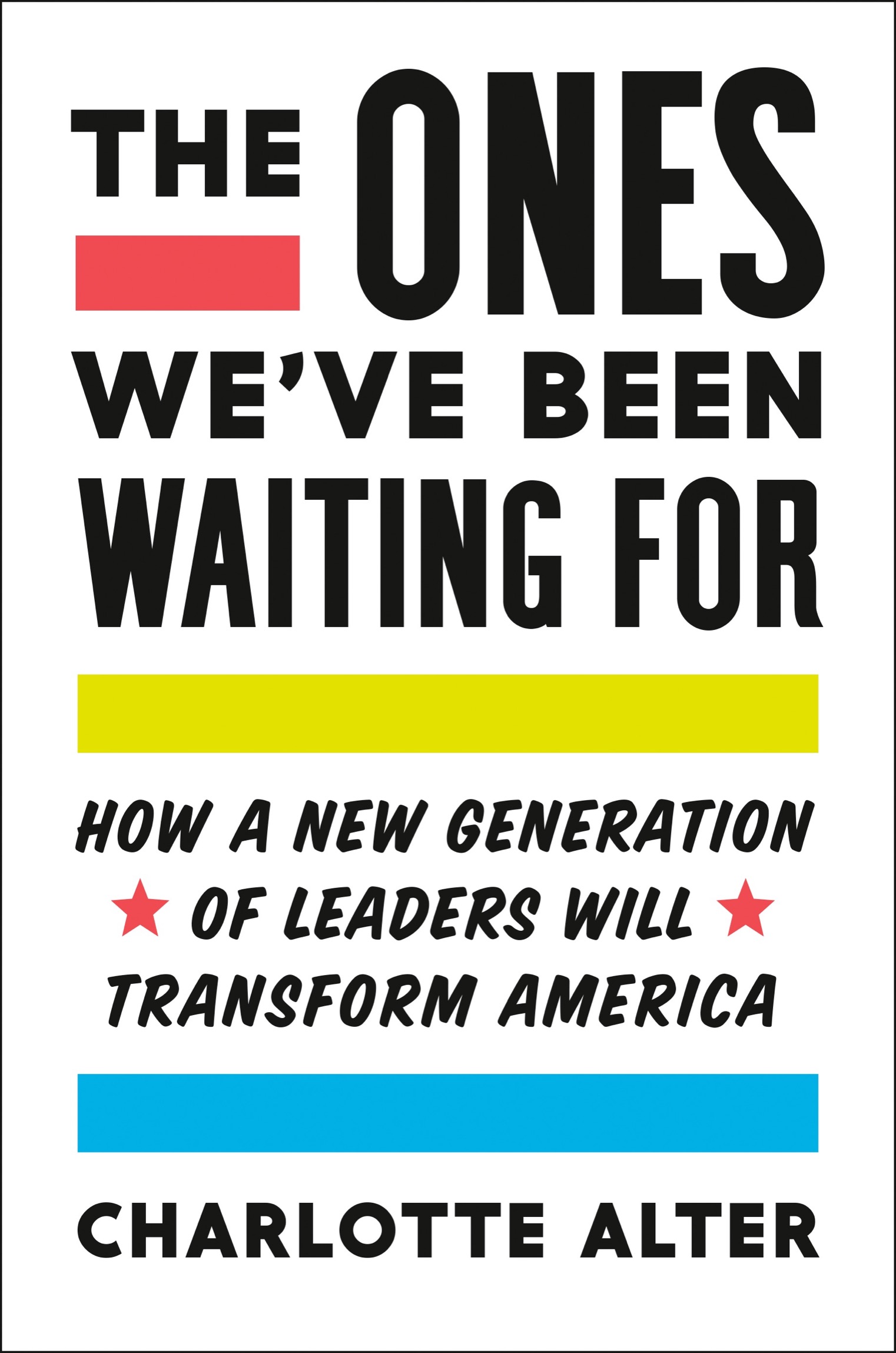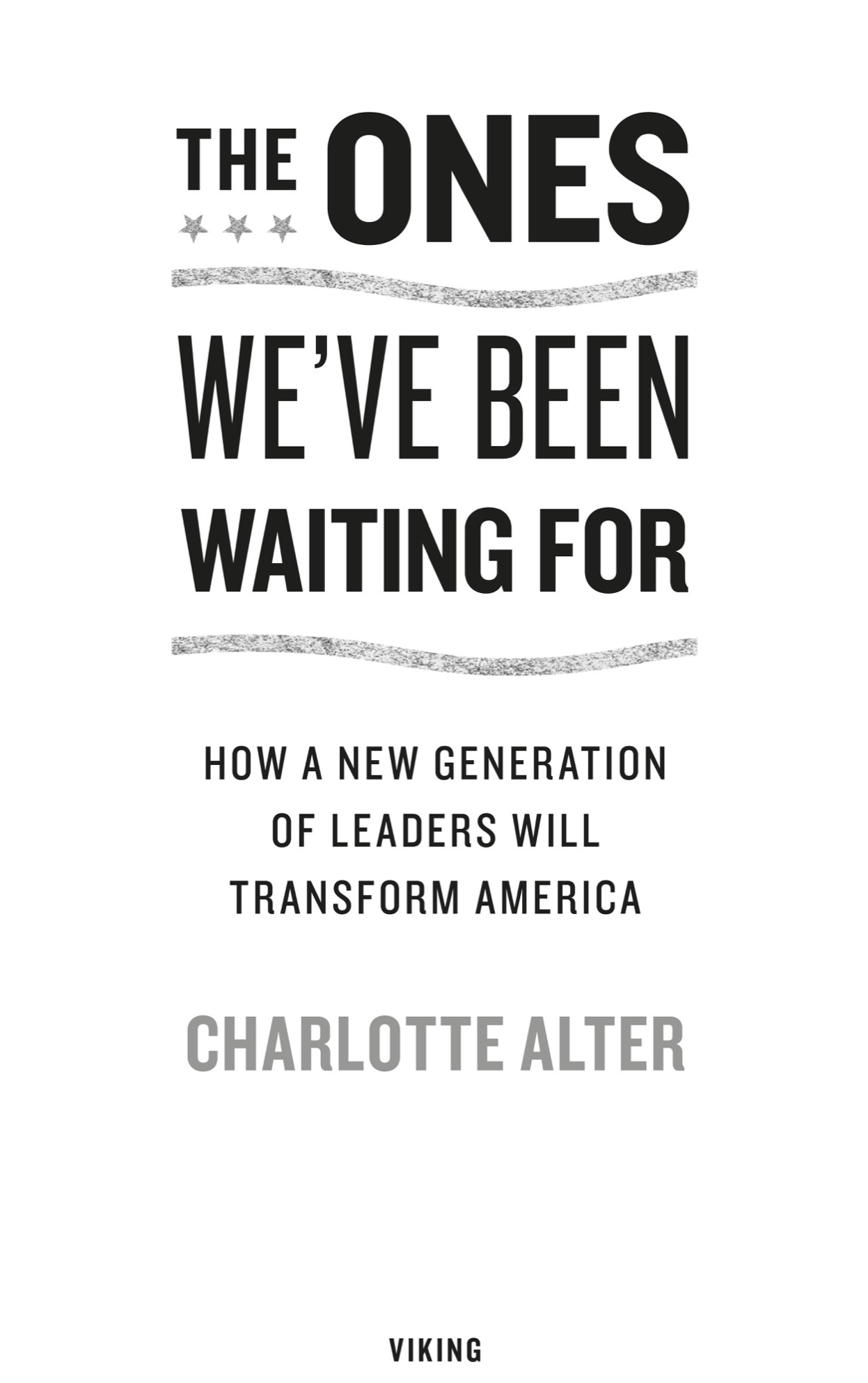VIKING
An imprint of Penguin Random House LLC
penguinrandomhouse.com
Copyright 2020 by Charlotte Alter
Penguin supports copyright. Copyright fuels creativity, encourages diverse voices, promotes free speech, and creates a vibrant culture. Thank you for buying an authorized edition of this book and for complying with copyright laws by not reproducing, scanning, or distributing any part of it in any form without permission. You are supporting writers and allowing Penguin to continue to publish books for every reader.
Names: Alter, Charlotte, author.
Title: The ones we've been waiting for : how a new generation of leaders will transform America / Charlotte Alter.
Other titles: Ones we have been waiting for
Description: New York : Viking, 2020. | Includes bibliographical references and index.
Identifiers: LCCN 2019053404 (print) | LCCN 2019053405 (ebook) | ISBN 9780525561507 (hardcover) | ISBN 9780525561514 (ebook)
Subjects: LCSH: Political participation--United States. | Generation Y--Political activityUnited States. | Political leadershipUnited States. | United StatesPolitics and government21st century.
Classification: LCC JK1764 .A46 2020 (print) | LCC JK1764 (ebook) | DDC 320.973dc23
LC record available at https://lccn.loc.gov/2019053404
LC ebook record available at https://lccn.loc.gov/2019053405
pid_prh_5.5.0_c0_r0
For my mom and dad, who taught me everything
The cruelties and obstacles of this swiftly changing planet will not yield to obsolete dogmas and outworn slogans. It cannot be moved by those who cling to a present which is already dying, who prefer the illusion of security to the excitement and danger which comes with even the most peaceful progress. This world demands the qualities of youth; not a time of life but a state of mind, a temper of the will, a quality of the imagination...
ROBERT F . KENNEDY , CAPETOWN , SOUTH AFRICA , JUNE , 1966
CONTENTS
INTRODUCTION
Love em or hate em, this much is true: one day soon, millennials will rule America.
This is neither wish nor warning but a fact, rooted in the physics of time and the biology of human cells. Millennialsborn between 1981 and 1996are already the largest living generation, the majority of the workforce, and will soon eclipse their parents as the biggest bloc of eligible voters. But even as America gets younger and more diverse, our national leadership is overwhelmingly dominated by white men in their seventies carrying baggage from the previous century. I offer this book as a reminder of the only real truth, in politics and in life: this, too, shall pass.
Millennial attitudes already define most other aspects of American society: their startups have revolutionized the economy, their tastes have shifted the culture, and their enormous appetite for social media has transformed human interaction. Politics is just the latest arena ripe for disruption.
This book is about those disrupters, the stepper-uppers, the young leaders attempting to drag our government into the twenty-first century. Others have written well about the millennial social identity in general, their unique economic peril, and the young activists and organizers who spurred the enormous social movements of the last twenty years. This is not that book.
Instead, this is about the electedsthe young mayors and city council members and state legislators and members of Congress who ran for office and won, the first in their generation to gain political power. While a septuagenarian president strutted and fretted in the Oval Office, I spent the last three years crisscrossing the country meeting the young politicians trying to build a new America from the ground up. The thirty-two-year-old mayor who renovated downtown Ithaca, the twenty-nine-year-old bartender who proposed a Green New Deal days after she arrived in Congress, the thirty-five-year-old congresswoman trying to attract more women to the GOP, the thirty-eight-year-old gay veteran running for president of the United States: these young leaders are the vanguard of millennial political power, and theyre only the first of their cohort to step up to the plate.
I dont pretend to know what will happen to any of their individual political careers. Im not trying to predict who will be president in 2020, or in the Senate in 2030, or Speaker of the House in 2040. But no matter what happens to them individually, studying their livesthe experiences that define their attitudes, the attitudes that define their politicscan give us a preview of what America might look like when their generation is in charge. I am not arguing that millennials will save America: they will surely bring their own flawed assumptions and misguided ideas into the political realm, just as their parents did. But a country run by millennials will look different than the boomer-built America, and this book attempts to figure out what those differences might look like.
Like all younger generations, millennials get a bad rap: boomers and Gen Xers think theyre entitled, overly sensitive, obsessed with social media, and naive about the ways of the world. Each of those stereotypes has a grain of truthjust ask anyone whos ever hired an annoying millennial. But when taken collectively, the qualities that seem grating on an individual level actually hint at a broader political disposition. Individually, millennials are stereotyped as entitled; collectively, they demand broad government investment in a twenty-first-century social safety net. Individually, theyre caricatured as oversensitive to microaggressions; collectively, theyre pushing toward a more comprehensive vision of social justice. Individually, they seem glued to their phones; collectively, their intuitive use of social networks has given them a fresh understanding of how individuals work within systems. Individually, they come off as naive or demanding; collectively, that looks a lot like idealism.
Politics is supposed to be about the future, even if the last four years have apparently been aimed at making America great again. This may be an era defined by smartphones, but the Speaker of the House, the Senate Majority Leader, and three of the top Democratic presidential candidates were all born in the 1940s, well before the invention of the color television, the polio vaccine, and the bikini. President Donald Trump was the oldest first-term president ever, elected mostly by white voters over sixty-five and enabled by one of the oldest Congresses in history. He is one of only four American presidents (alongside William Henry Harrison, James Buchanan, and Ronald Reagan) who were older than sixty-five when they were first inaugurated.
The graying of US politics feels especially claustrophobic given that Americas most visionary leaders have typically been young. Alexander Hamilton was just thirty-two when he became the first secretary of the Treasury, Thomas Jefferson was thirty-three when he wrote the Declaration of Independence, Martin Luther King Jr. was thirty-four when he led the March on Washington, and John F. Kennedy was forty-four when he promised to send a man to the moon. Even the middle-aged presidents have historically been much younger than our current leadership: Abraham Lincoln was in his early fifties when he preserved the Union in the Civil War, roughly the same age Franklin Delano Roosevelt was at the time of the New Deal. The powdered wigs and black-and-white photographs make American history look like a succession of old men, but actually, some of the most momentous shifts have resulted from younger generations replacing older ones.



